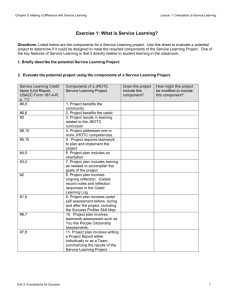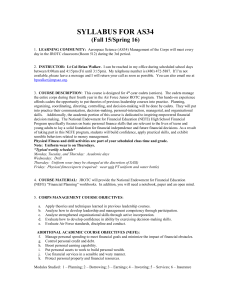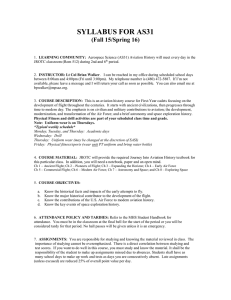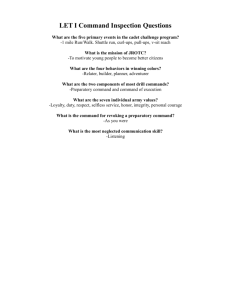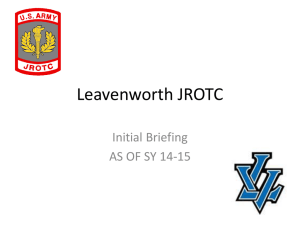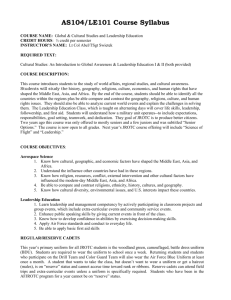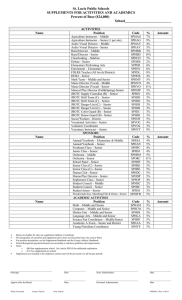AS32 Syllabus
advertisement
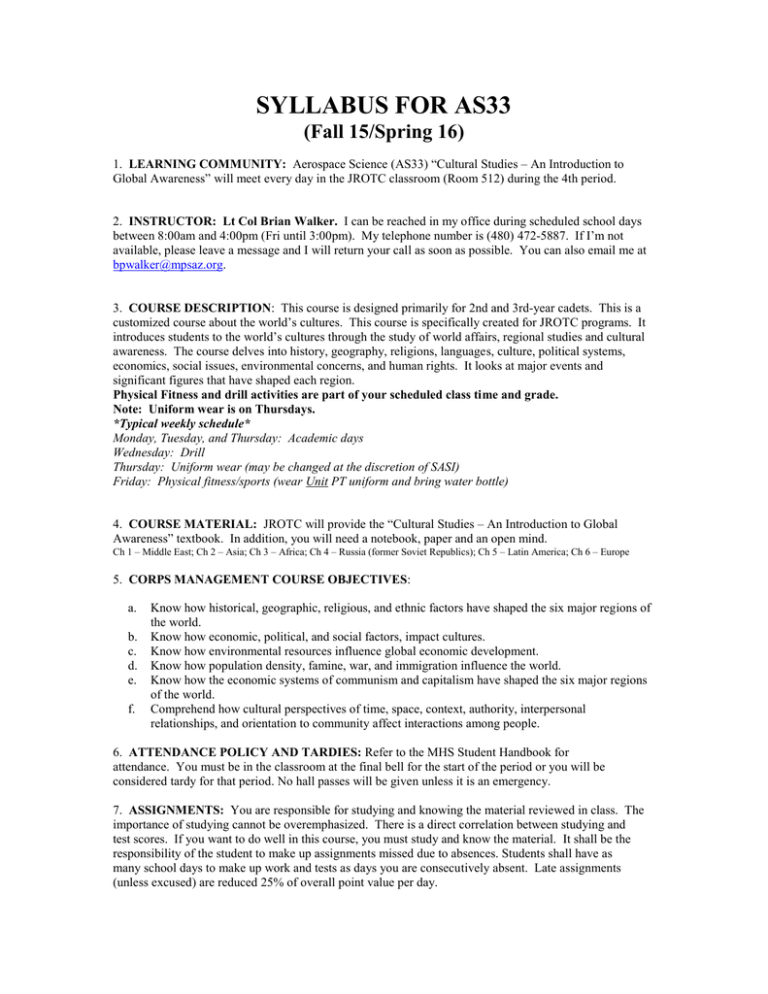
SYLLABUS FOR AS33 (Fall 15/Spring 16) 1. LEARNING COMMUNITY: Aerospace Science (AS33) “Cultural Studies – An Introduction to Global Awareness” will meet every day in the JROTC classroom (Room 512) during the 4th period. 2. INSTRUCTOR: Lt Col Brian Walker. I can be reached in my office during scheduled school days between 8:00am and 4:00pm (Fri until 3:00pm). My telephone number is (480) 472-5887. If I’m not available, please leave a message and I will return your call as soon as possible. You can also email me at bpwalker@mpsaz.org. 3. COURSE DESCRIPTION: This course is designed primarily for 2nd and 3rd-year cadets. This is a customized course about the world’s cultures. This course is specifically created for JROTC programs. It introduces students to the world’s cultures through the study of world affairs, regional studies and cultural awareness. The course delves into history, geography, religions, languages, culture, political systems, economics, social issues, environmental concerns, and human rights. It looks at major events and significant figures that have shaped each region. Physical Fitness and drill activities are part of your scheduled class time and grade. Note: Uniform wear is on Thursdays. *Typical weekly schedule* Monday, Tuesday, and Thursday: Academic days Wednesday: Drill Thursday: Uniform wear (may be changed at the discretion of SASI) Friday: Physical fitness/sports (wear Unit PT uniform and bring water bottle) 4. COURSE MATERIAL: JROTC will provide the “Cultural Studies – An Introduction to Global Awareness” textbook. In addition, you will need a notebook, paper and an open mind. Ch 1 – Middle East; Ch 2 – Asia; Ch 3 – Africa; Ch 4 – Russia (former Soviet Republics); Ch 5 – Latin America; Ch 6 – Europe 5. CORPS MANAGEMENT COURSE OBJECTIVES: a. b. c. d. e. f. Know how historical, geographic, religious, and ethnic factors have shaped the six major regions of the world. Know how economic, political, and social factors, impact cultures. Know how environmental resources influence global economic development. Know how population density, famine, war, and immigration influence the world. Know how the economic systems of communism and capitalism have shaped the six major regions of the world. Comprehend how cultural perspectives of time, space, context, authority, interpersonal relationships, and orientation to community affect interactions among people. 6. ATTENDANCE POLICY AND TARDIES: Refer to the MHS Student Handbook for attendance. You must be in the classroom at the final bell for the start of the period or you will be considered tardy for that period. No hall passes will be given unless it is an emergency. 7. ASSIGNMENTS: You are responsible for studying and knowing the material reviewed in class. The importance of studying cannot be overemphasized. There is a direct correlation between studying and test scores. If you want to do well in this course, you must study and know the material. It shall be the responsibility of the student to make up assignments missed due to absences. Students shall have as many school days to make up work and tests as days you are consecutively absent. Late assignments (unless excused) are reduced 25% of overall point value per day. 8. CLASSROOM RULES OF CONDUCT: See the AFJROTC Cadet Handbook and follow the rules. 9. EXAMS: There will be an evaluation for each block of instruction. 10. GRADING POLICY: Quarter and Semester grades are determined by points accumulated in the following areas: Participation (requires attendance) Assignments Quizzes Projects Tests Uniform Wear Conduct/Attitude/Professionalism (must achieve 80% or better to be retained in JROTC) Physical Fitness and Drill Uniform wear: it is expected that you will wear your uniform correctly and with pride. Failure to wear the uniform without prior excusal from the instructor will result in a full reduction in uniform points. Also, failure to consistently wear the uniform is cause for an “F” grade and disenrollment from JROTC. Bottomline: it is very easy to get a good uniform grade…wear the correct uniform on the correct day. CAP: Additionally, you are “always on parade” in JROTC! Everyone knows, because of the uniform, that you are a JROTC cadet. There’s no escaping the fact that you are held to a higher standard as a JROTC cadet. Simply put, more is expected of you than a “normal” Mesa High student. Consequently, always ensure your conduct is exemplary. Grading scale: Letter grade will be determined by the total accumulation of points at the end of each Quarter and Semester. Total points accumulated must equate to 60% of the total points available to achieve a passing grade. Letter grades are as follows: Grading is as follows: A B C D F 90-100% 80-89.99% 70-79.99% 60-69.99% Less than 60 %
